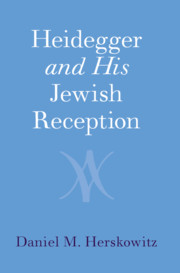Book contents
- Heidegger and His Jewish Reception
- Heidegger and His Jewish Reception
- Copyright page
- Dedication
- Contents
- Preface
- Acknowledgments
- 1 Herkunft and Zukunft: Heidegger, Christianity, and Secularization
- 2 Kant’s Legacy and New Thinking: Heidegger, Cassirer, and Rosenzweig
- 3 A Christian Anthropology? Early Jewish Readings of Sein und Zeit
- 4 Dwelling Prophetically: Martin Buber’s Response to Heidegger
- 5 The Destruktion of Jerusalem: Leo Strauss on Heidegger
- 6 God, Being, Pathos: Abraham Joshua Heschel’s Theological Rejoinder to Heidegger
- 7 Uprooting Paganism: Emmanuel Levinas Faces Heidegger
- Conclusion Which God Will Save Us? Heidegger and Judaism
- Bibliography
- Index
6 - God, Being, Pathos: Abraham Joshua Heschel’s Theological Rejoinder to Heidegger
Published online by Cambridge University Press: 24 September 2020
- Heidegger and His Jewish Reception
- Heidegger and His Jewish Reception
- Copyright page
- Dedication
- Contents
- Preface
- Acknowledgments
- 1 Herkunft and Zukunft: Heidegger, Christianity, and Secularization
- 2 Kant’s Legacy and New Thinking: Heidegger, Cassirer, and Rosenzweig
- 3 A Christian Anthropology? Early Jewish Readings of Sein und Zeit
- 4 Dwelling Prophetically: Martin Buber’s Response to Heidegger
- 5 The Destruktion of Jerusalem: Leo Strauss on Heidegger
- 6 God, Being, Pathos: Abraham Joshua Heschel’s Theological Rejoinder to Heidegger
- 7 Uprooting Paganism: Emmanuel Levinas Faces Heidegger
- Conclusion Which God Will Save Us? Heidegger and Judaism
- Bibliography
- Index
Summary
In May 1963, Abraham Joshua Heschel delivered the Raymond Fred West Memorial Lectures at Stanford University. The three lectures – “In the Likeness and Unlikeness of God,” “In Search of Meaning,” and “Existence and Exaltation” – were later compiled in the book Who Is Man?, published in 1965. In this condensed and mature expression of many steadfast positions, Heschel challenges modern secularism through presenting his phenomenological “theology of man” in an implicit and explicit confrontation with Heidegger’s existential ontology. In Heschel’s formulation, Heidegger’s philosophy “seeks to relate the human being to a transcendence called being as such” while his own thought, “realizing that human being is more than just being, that human being is living being, seeks to relate man to divine living, to a transcendence called the living God.” The aim of this chapter is to organize Heschel’s otherwise unsystematic critique of Heidegger as a unified theological argument and critically assess it.
- Type
- Chapter
- Information
- Heidegger and His Jewish Reception , pp. 220 - 242Publisher: Cambridge University PressPrint publication year: 2020

